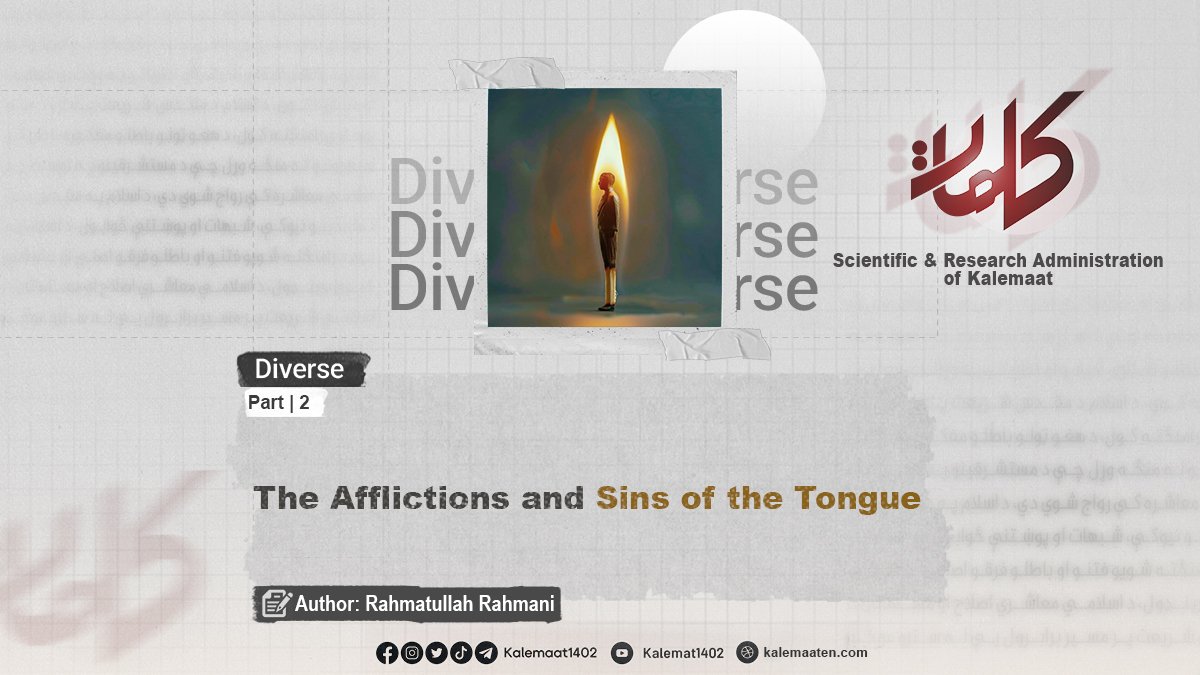
Author: Rahmatullah Rahmani
The Afflictions and Sins of the Tongue (Part Two)
The first affliction: Talking about irrelevant matters
The first affliction of the tongue is idle talk. Allah Almighty has provided man with the means and factors for attaining knowledge and reaching the precious peaks of wisdom and awareness and has considered speech as one of the ways of transmitting knowledge and virtue.
The wise Lord warns man against speech that does not benefit him and He forbids people from idle talk in the Holy Quran. In a way that He considers listening to idle talk as a factor that prevents a person from perfection and considers avoiding idle talk as a sign of human dignity. Unfortunately, there are people who engage in idle talk from the moment they leave the house until the time they return; speech in which there is not even the slightest scientific or religious benefit, and even if they do not speak, no harm will come to them. For example, some people who are old and whose feet are on the verge of death, but who sit in front of shops and public places with full enthusiasm and talk about their travel memories and other useless things.
In Surah Al-Mu’minun, Allah Almighty describes the characteristics of believers as follows: «وَالَّذِينَ هُمْ عَنِ اللَّغْوِ مُعْرِضُونَ» Translation: “And those who avoid idle talk.”
One of the characteristics of a believer is avoiding idle talk, and a believer not only hates idle talk, but also hates hearing such talk.
Allah Almighty also says in another place: «وَإِذَا سَمِعُواً اللَّغْوَ أَعْرَضُوا عَنْهُ وَقَالُواْ لَنَا أَعْمَلُنَا وَلَكُمْ أَعْمَلُكُمْ سَلَامٌ عَلَيْكُمْ لَا نَبْتَغِى الْجَهِلِينَ» Translation: “And when they hear vain talk, they turn away from it and say: Our deeds are for us, and your deeds are for you. Peace be upon you. We do not seek the ignorant.” Such people do not listen to vain and excessive talk and know the value of their own time and others and feel responsible for it. They make the best use of their precious life and opportunities so that they do not experience regret.
Idle talk means talking about something that does not benefit a person, and the Holy Prophet (PBUH) said in this regard: «مِنْ حُسْنِ إِسْلاَمِ الْمَرْءِ تَرْكُهُ مَا لاَ يَعْنِيهِ» Translation: “One of the good things about Islam is that a Muslim person avoids meaningless and useless talk.”
Idle talk is that, if not said, will not cause any harm to the speaker. Therefore, such talk is called idle talk. In the Glorious Quran, when Paradise is mentioned as the gathering of the chosen, the lovers, and the pure in the sight of Allah, Allah considers freedom from idle talk as one of its prominent features. Those who in this world, out of love and longing for Allah Almighty, were far from vain and useless deeds, words and thoughts, when they rest near the eternal abode of Allah for the sake of reward, it is certain that they will neither speak nonsense nor hear nonsense. In fact, in gatherings, we too should follow the example of such gatherings and, like them, avoid vanity; a gathering in which: «لَا يَسْمَعُونَ فِيهَا لَغْوًا وَلَا تَأْثِيمًا* إِلَّا قِيلًا سَلَامًا سَلَامًا» Translation: “In Paradise, they will not hear any idle talk or any sinful speech, but they will hear a word of peace.” Because in Paradise, no one will speak nonsense or sinful speech, and there will be no cursing, harming or sinful speech. The people of Paradise greet each other by saying “Hello”, “salutation” and “Hello…!”
Therefore, when worldly gatherings are free from idle and sinful speech, a breeze from Paradise has actually blown upon them. In another verse, referring to the purity and cleanliness of the gatherings of the people of Paradise from idle talk, it says: “لَا يَسْمَعُونَ فِيهَا لَغْوًا وَلَا كِذَابًا” Translation: “They will not hear therein idle talk or falsehood.” Meaning: The righteous will not hear idle talk in Paradise, nor will they lie to one another, contrary to what happens in worldly gatherings; because Paradise is the abode of peace and everything in it is free from defects and flaws. Idleness: is idle and vain speech.
“لَا تَسْمَعُ فِيهَا لَغِيَةً” Translation: “You will not hear therein idle talk.” Meaning: O addressee! You will not hear any useless words in the speech of the people of Paradise, because they will speak only of wisdom and praise of Allah Almighty for the eternal blessings He has bestowed upon them.
And this is the difference between the gatherings of Paradise and some worldly gatherings. In some worldly gatherings, people feel less responsible for the time of others and fill it with words that not only harm them, but also leaving these words will be beneficial for everyone.
Perhaps some people will think less about how much of what they said has been beneficial to the listeners? To what extent do their words have excellent content and meaning? Has their speech turned the darkness of ignorance into the light of knowledge? Has it added to the knowledge and wisdom of those present or has it wasted their precious opportunities? Let us think with ourselves whether in life we are only seeking to fill our free time or are we thinking about using it better? And basically, how much do we try to make others get the most and best out of the opportunity they have with us? If we want our worldly gatherings to be more like the gatherings of the people of heaven, we must have a logical and worthy answer to the above questions. If we have a good answer, we will be sure that our friendly meetings will be small and complete models of good gatherings. To avoid nonsense, we should summarize the issue that is expressed in five minutes in one minute.
According to some researchers, women speak seven thousand words a day and men speak on average between two and three thousand words.
Continues…


